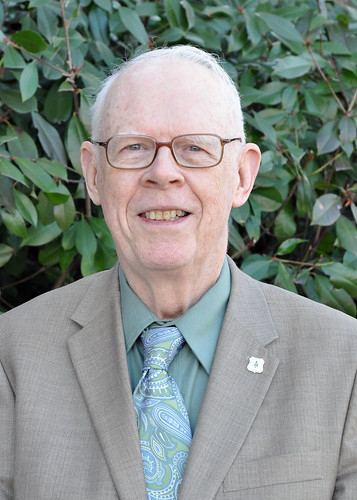
When a forester embraces the various challenges of his job – such as timber management, building roads, squelching wildfires or perhaps even national policy issues – you can count on the variety of experiences and the ever-changing nature of the job to provide interest.
For Dick Fitzgerald, currently the agency’s assistant director of forest management in the Washington Office, it became a 57-year career and running. He began by working summers in a fire lookout before becoming full time as a junior forester, as it was known in those days. He also worked as a district ranger, managed timber sales and served as a regional silviculturist in two of the agency’s nine regions.
“Each job has had its challenges,” Fitzgerald said. “During my first jobs, I was out in the country in places where a lot of folks had never been locating and developing roads to support the mission. Working as a district ranger, I worked with the public from local areas, trying to balance a forest’s timber or range or recreation agenda.”
As a regional silviculturist, he focused on a range of activities including creating training programs and developing forest prescriptions to meet forest land management objectives. In the Washington Office, his work focuses on resolving issues for the field units, which sometimes mean explaining those field needs, whether to Congress or other agencies.
“We’re trying to eliminate the barriers so the district and forest level professionals can accomplish their work and meet the public’s needs,” he said.
Throughout his career, he moved around a lot, talked with as many people as possible and experienced the diversity of landscapes across the country – from temperate forests in Oregon and Washington states in the agency’s Pacific Northwest Region to the Southern Region, where he could observe different species and how forests differed from a coastal plain forest to the Piedmont or the mountains.
For Fitzgerald, it’s been a career full of discovery, service and awe. He’s lived in remote sites far from town and has left spouse and family to fend for themselves while he fought wildfires.
“Yes, there were hardships, but they also helped broaden one’s perspective in terms of what the Forest Service is all about and how to make things work,” he said. “I can’t begin to name my fellow employees who helped mentor me over the years and those who support me here in the office today. There are so many to thank for all of their support.”
And what about the future?
“I’d focus on a time frame 100 years from now so I could see what was going on. I’m not the type to count the days and hours until I can retire,” he said. “I’m interested in what the future will bring, what it will look like and looking back to see what things I worked on that were successful and what things could have been improved.”
Read more about Fitzgerald in the agency’s special feature Faces of the Forest.

